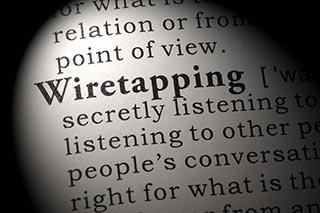Warrant to Search Places or to Electronically Intercept Communications – What’s Required?

Much has been written and tweeted about this past week concerning this topic. Politics aside for the moment, what does the government need to demonstrate to a court that a place should be searched, or a person’s phone calls should be intercepted?
To search someone’s home or office, the government must show that there is probable cause to believe that evidence of a crime is presently at the location to be searched. Probable cause exists “where the facts and circumstances within the agents’ knowledge, and of which they had reasonably trustworthy information . . . are sufficient in themselves to warrant a man of reasonable caution in the belief that . . .” a crime has been or is being committed, and that seizable property can be found at the place or on the person to be searched. The probable cause must be timely and the place to be searched must be described with particularity. If information comes from an informant, his or her credibility must be established, either by reciting prior information that has proven to be reliable, or by independent verification of a number of the details provided by the informant.
In the case of a Title III intercept, commonly referred to as a wiretap, there are extra statutory factors that must be met before electronic surveillance will be authorized. Only certain enumerated crimes are subject to a wiretap as an investigatory tool. Most importantly, the affidavit must establish investigative need and that traditional methods of investigation have either failed, are likely not to succeed, or are too dangerous.
What if the affidavit provided to the court for the warrant contains false information? Does that mean the warrant should never have been issued, or that the evidence gathered should be suppressed? Generally, a warrant issued by a judge is presumed valid. In challenging a warrant, the person must demonstrate that (1) the affidavit contained a materially false statement; (2) the false statement was made knowingly and intentionally, or with reckless disregard for the truth; and (3) the allegedly false statement is necessary to the finding of probable cause. If these three points are demonstrated, then a Franks hearing must be held.
The key point is that the warrant will survive, and the evidence gathered admitted in court, if there is sufficient probable cause remaining once the alleged false statement(s) are removed from the affidavit. Generally, even if a warrant was issued with a materially false statement, that was known to be false when made, the evidence will not be suppressed unless the judge would not have issued the warrant if those statements were not included in the application.
Pertinent to recent press reports and the 24-hour cable news cycle, when a Title III warrant has been issued, it is only valid for a specified period of time. After which, the agent must apply for an extension(s). In that application, the agent must demonstrate to the court that material evidence of the crimes being investigated have been intercepted and that the continued authorized interception will likely yield additional evidence. Thus, any renewals will necessarily mean that evidence of the specified crimes have been electronically gathered and that continued electronic interceptions will likely yield additional material intercepts.
Stahl Gasiorowski Criminal Defense Lawyers aggressively defend individuals charged with complex federal and state crimes.Founder Robert G. Stahlis recognized as one of the top criminal defense attorneys in the NY/NJ area for his skills, knowledge and success. To contact us to discuss your case, call 908.301.9001for our NJ office and 212.755.3300for our NYC office, or email us at rgs@sgdefenselaw.com.















